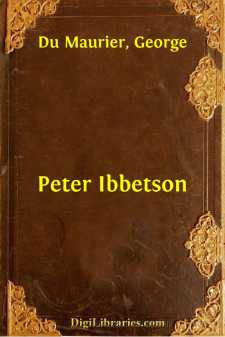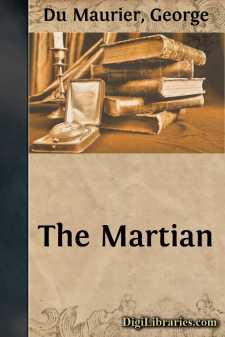Categories
- Antiques & Collectibles 13
- Architecture 36
- Art 48
- Bibles 22
- Biography & Autobiography 813
- Body, Mind & Spirit 142
- Business & Economics 28
- Children's Books 15
- Children's Fiction 12
- Computers 4
- Cooking 94
- Crafts & Hobbies 4
- Drama 346
- Education 46
- Family & Relationships 57
- Fiction 11829
- Games 19
- Gardening 17
- Health & Fitness 34
- History 1377
- House & Home 1
- Humor 147
- Juvenile Fiction 1873
- Juvenile Nonfiction 202
- Language Arts & Disciplines 88
- Law 16
- Literary Collections 686
- Literary Criticism 179
- Mathematics 13
- Medical 41
- Music 40
- Nature 179
- Non-Classifiable 1768
- Performing Arts 7
- Periodicals 1453
- Philosophy 64
- Photography 2
- Poetry 896
- Political Science 203
- Psychology 42
- Reference 154
- Religion 513
- Science 126
- Self-Help 84
- Social Science 81
- Sports & Recreation 34
- Study Aids 3
- Technology & Engineering 59
- Transportation 23
- Travel 463
- True Crime 29
Peter Ibbetson
Description:
Excerpt
Part One
INTRODUCTION
The writer of this singular autobiography was my cousin, who died at the ——- Criminal Lunatic Asylum, of which he had been an inmate three years.
He had been removed thither after a sudden and violent attack of homicidal mania (which fortunately led to no serious consequences), from ——- Jail, where he had spent twenty-five years, having been condemned to penal servitude for life, for the murder of —— ——, his relative.
He had been originally sentenced to death.
It was at —— Lunatic Asylum that he wrote these memoirs, and I received the MS. soon after his decease, with the most touching letter, appealing to our early friendship, and appointing me his literary executrix.
It was his wish that the story of his life should be published just as he had written it.
I have found it unadvisable to do this. It would revive, to no useful purpose, an old scandal, long buried and forgotten, and thereby give pain or annoyance to people who are still alive.
Nor does his memory require rehabilitation among those who knew him, or knew anything of him—the only people really concerned. His dreadful deed has long been condoned by all (and they are many) who knew the provocation he had received and the character of the man who had provoked him.
On mature consideration, and with advice, I resolved (in order that his dying wishes should not be frustrated altogether) to publish the memoir with certain alterations and emendations.
I have nearly everywhere changed the names of people and places; suppressed certain details, and omitted some passages of his life (most of the story of his school-days, for instance, and that of his brief career as a private in the Horse Guards) lest they should too easily lead to the identification and annoyance of people still alive, for he is strongly personal at times, and perhaps not always just; and some other events I have carefully paraphrased (notably his trial at the Old Bailey), and given for them as careful an equivalent as I could manage without too great a loss of verisimilitude.
I may as well state at once that, allowing for these alterations, every incident of his natural life as described by himself is absolutely true, to the minutest detail, as I have been able to ascertain.
For the early part of it—the life at Passy he describes with such affection—I can vouch personally; I am the Cousin "Madge" to whom he once or twice refers.
I well remember the genial abode where he lived with his parents (my dear uncle and aunt); and the lovely "Madame Seraskier," and her husband and daughter, and their house, "Parva sed Apta," and "Major Duquesnois," and the rest.
And although I have never seen him since he was twelve years old, when his parents died and he went to London (as most of my life has been spent abroad), I received occasional letters from him.
I have also been able to obtain much information about him from others, especially from a relative of the late "Mr. and Mrs. Lintot," who knew him well, and from several officers in his regiment who remembered him; also from the "Vicar's daughter," whom he met at "Lady Cray's" and who perfectly recollects the conversation she had with him at dinner, his sudden indisposition, and his long interview with the "Duchess of Towers," under the ash-tree next morning; she was one of the croquet-players....




